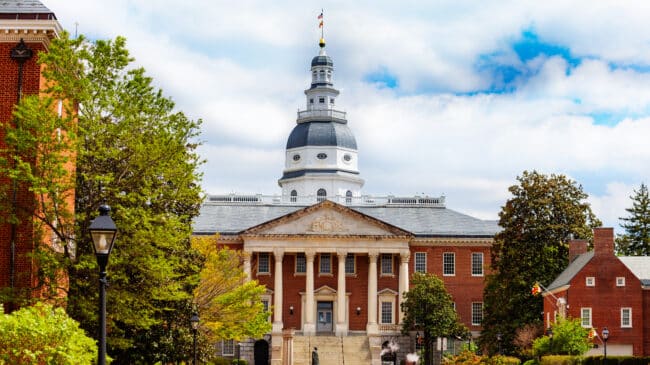Maryland State Senate Finance Committee
Senate Bill 259 Flavored Tobacco Products–Prohibition
Chairperson Griffith and members of the committee:
My name is Michelle Minton, and I am a senior policy scholar at the Reason Foundation, a 501(c)(3) nonprofit, nonpartisan public policy research organization. As an expert in public policy, a Maryland resident, and former smoker, I am grateful for the opportunity to submit my testimony regarding the proposed prohibition of flavored tobacco products.
The aim of the proposed prohibition to reduce adult smoking and discourage youth initiation of any tobacco or nicotine product is a laudable one. However, based on science and historical evidence, we fear this proposal will not achieve its goal, but rather lead to greater health disparities and criminal justice inequities while radically increasing the size and danger of the illicit tobacco market.
There is no question that smoking is deadly, but guilt by association is a poor foundation for government policy. Lumping everything under the definition of “tobacco” doesn’t change the scientific fact that noncombustible sources of nicotine (such as patches, gums, e-cigarettes, and snus) are vastly less harmful than the combustible cigarettes that will continue to be freely available throughout our state. Treating products that pose less than five percent of the risk of smoking the same as deadly combustible cigarettes, which kill half their users, is simply bad health policy.
This proposal would prohibit the sale of any flavored tobacco product, including non-combustible, and, therefore, less harmful substitutes for cigarettes. This would include the flavored versions of products, like snus, on which many adults in Maryland rely to stay smoke-free and the availability of which the U.S. Food and Drug Administration (FDA) has deemed to be in the best interests of public health. If this proposal is enacted, Maryland would outlaw, under criminal penalty, the sale of safer products that exist now or will exist in the future.
Youth
As with nearly all prohibitions, SB 259 is predicated mainly on the need to protect youth. While concern over youth experimentation with or the use of nicotine-containing products is worthy of attention, lawmakers should recognize that most youths do not use any form of tobacco at all. Recent data from the Centers for Disease Control and Prevention (CDC) indicates that less than two percent of youth currently smoke, and just over 14 percent use e-cigarettes.
In 2021, the Maryland Youth Risk Behavior Survey found that just 11 percent of Maryland high schoolers reported the use of electronic cigarettes, with the highest prevalence among white students (15 percent compared to 5 percent among black students), a significant decline from 2018 when 23 percent of high school students in Maryland reported any past-month e-cigarette use.
Outlawing legal sales of flavored e-cigarettes and other products is unlikely to make more progress for several reasons. First, the research continues to indicate that youth do not initiate vaping because of flavors. CDC surveys show the main reason youth cite for vaping is “curiosity,” followed by peer influence or family members. The results are similar for Maryland, with 39 percent of youth citing “curiosity” as their reason for using electronic cigarettes, followed by 19 percent who said they used them because a friend or family member does. Flavor availability was cited by just 9 percent of Maryland youth as the reason they use them.
Second, most youths do not acquire the tobacco products they use from licensed retailers, but rather from friends, family, or illicit sources. For example, of the 23 percent of Maryland youth who indicated current e-cigarette use in 2018, nearly half said they got them by borrowing them from a friend.
Given the current size of the illicit tobacco market and the massive increase we expect to occur in the wake of a menthol cigarette ban, the current proposal may unintentionally provide youth with greater access to flavored tobacco products through illicit dealers who typically do not verify the ages of their customers. Moreover, youth who do avail themselves of the illicit market may have greater access not just to tobacco, but other substances as well. For example, when the Department of Justice arrested two brothers in Baltimore for conspiracy to traffic $6.6 million worth of contraband cigarettes, they were also found to be dealing in illicit oxycodone.
Illicit suppliers may also choose to make their own flavored tobacco products instead of buying them where they are legal and transporting them to Maryland. With regard to menthol cigarettes, this task would be exceedingly simple, requiring nothing more than a would-be trafficker to legally purchase unflavored cigarettes and add menthol-flavoring with flavor beads, eucalyptus oil, sprays, and numerous other methods, the safety of which depend entirely on what is used as a flavoring agent. If this prohibition is enacted, Maryland lawmakers should probably be prepared for another outbreak of “vaping-related” lung injuries as we saw in the illicit market for cannabis oil vaping cartridges during the summer of 2019.
Lastly, laudable as the desire to prevent youth tobacco use may be, research suggests that banning flavored tobacco products may result in the perverse outcome of increasing youth smoking. For example, Yale University’s Abigail Friedman found that after the city of San Francisco enacted its ban on all flavored tobacco products in 2018, youth in San Francisco were twice as likely to smoke compared to adolescents in similar jurisdictions without such bans.
Illicit Sales
Supporters of this and similar prohibition proposals argue that outlawing products for which there is significant demand, particularly among Marylanders of color, will not lead to increased illicit tobacco trafficking nor cause increased interactions with law enforcement. But the experiences of other jurisdictions which have attempted similar bans, as well as Maryland’s own experience with drug prohibition, make such assertions hard to believe.
The harm or benefit of any prohibition largely depends on how those living under it respond. With regard to this proposal, some current users of flavored tobacco may respond by quitting tobacco use altogether, eliminating the risks to those individuals. However, according to the Food and Drug Administration’s own analysis of its proposed national menthol cigarette ban, around half will simply switch to equally non-menthol cigarettes, conferring zero health benefits. Moreover, the federal government estimated that roughly half of the public health benefits anticipated by outlawing combustible menthol cigarettes would come as a result of smokers switching to flavored non-combustible products, which Maryland’s proposed prohibition would also outlaw.
In Maryland, menthol cigarettes account for about half of all cigarettes sold in the state. Even without including all of the other flavored tobacco products, this represents a significantly-sized market which, if this proposal is enacted, would be pushed into the arms of the unlicensed tobacco dealers already operating in our state. Rather than encouraging healthier behaviors from Maryland residents, this could increase risks to their welfare, increase enforcement costs, and divert millions in tax revenue to other states and criminal operations.
Case Study: Massachusetts
Massachusetts implemented the country’s first state-wide ban on flavored tobacco products in June 2020. My colleague Jacob Rich, a policy researcher for both Reason Foundation and the Center for Evidence-Based Care Research at the Cleveland Clinic, analyzed the ban’s impact by comparing cigarette sales in Massachusetts before and after its implementation. His analysis of national cigarette sales data shows that in the year following the prohibition, sales of menthol and non-menthol cigarettes declined in Massachusetts. However, sales in bordering counties increased, leading to a net overall increase in cigarette sales within the region of approximately 7.2 million packs. This indicates that the ban in Massachusetts merely diverted current menthol smokers to equally harmful non-menthol cigarettes and pushed sales of both menthol and non-menthol cigarettes to neighboring states.
The result was no decrease in overall tobacco use and $125 million lost tobacco tax revenue for Massachusetts. In Maryland, tobacco trafficking is likely to be significantly worse than in Massachusetts, given our residents’ proximity and access to neighboring states which do not yet outlaw flavored tobacco.
Public Health
The FDA acknowledges a “continuum of risk” for the variety of tobacco and nicotine products currently on the market, with cigarettes being the most dangerous and non-combustible alternatives, such as snus, e-cigarettes, heated tobacco, and nicotine pouches, being the least dangerous. The FDA has already authorized some of these products, deeming their availability to be in the best interest of public health, and allowed some to even be marketed as reduced-risk substitutes for smoking.
The proposal before this committee would unnecessarily strip adults in Maryland of access to these FDA-authorized and potentially life-saving alternatives, now and in the future.
According to a 2020 study by Yale School of Public Health researchers, e-cigarette flavors are positively associated with smoking cessation outcomes for adults but not associated with increased youth smoking. Moreover, the prestigious Cochrane Review concluded that e-cigarettes are more effective than traditional nicotine replacement therapies in helping smokers quit smoking cigarettes. Criminalizing the sale of flavored e-cigarettes in Maryland, which are overwhelmingly preferred by adult vapers, risks driving users of these alternatives back to smoking while also fueling illicit tobacco markets, causing net harm to our state’s public health, social welfare, and economic well-being.
Nicotine is not risk-free and the interest in preventing youth uptake is understandable. We all want to see fewer people smoking and fewer youth experimenting with tobacco. But the desire to protect adolescents from all risks, even those that are relatively small, does not justify at-any-cost measures like the one currently under consideration. Regulators must show regard for the needs of other populations, including youth once they reach adulthood, and consider the harm such laws may have on their welfare.
If Maryland’s state and local authorities are competent enough to regulate flavored alcohol and soon-to-be-legalized flavored cannabis in ways that preserve adults’ ability to purchase them safely and legally without encouraging youth use, they should be similarly capable of limiting the sale of flavored nicotine products to adults in Maryland, especially when they offer current and future smokers in the state a life-saving alternative to combustible cigarettes.

